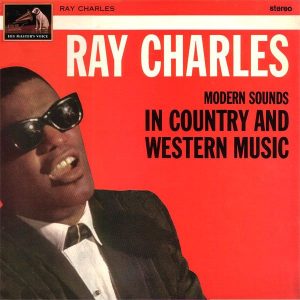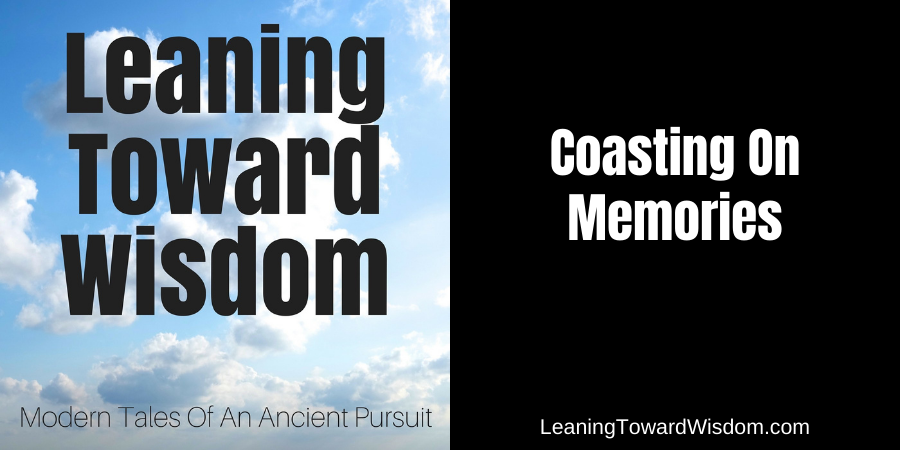Podcast: Play in new window | Download (Duration: 48:09 — 44.1MB)
Subscribe: Apple Podcasts | Spotify | iHeartRadio | Email | RSS | More
“A girl I became friends with on a school trip in high school fell asleep on my shoulders on the ride back.”
“I’m still coasting on that memory.”
Crimson and Clover and Crystal Blue Persuasion were on the same album. I was 11. It was one of my first and biggest music memories of “my” music…and perhaps it was the first record I wore out. Literally.
 Listening to Top 40 radio was a constant in the car. At home, the biggest memory and influence was my dad’s 1962 Ray Charles’ record, Modern Sounds of Country and Western Music.
Listening to Top 40 radio was a constant in the car. At home, the biggest memory and influence was my dad’s 1962 Ray Charles’ record, Modern Sounds of Country and Western Music.
Side one
1. “Bye Bye Love”
2. “You Don’t Know Me”
3. “Half as Much”
4. “I Love You So Much It Hurts”
5. “Just a Little Lovin’ (Will Go a Long Way)”
6. “Born to Lose”
Side two
1. “Worried Mind”
2. “It Makes No Difference Now”
3. “You Win Again”
4. “Careless Love”
5. “I Can’t Stop Loving You”
6. “Hey, Good Lookin'”
My early music experiences consisted of great rhythm and harmonies. My sister loved The Lettermen and later on, The Carpenters. For me, Ray Charles was hard to beat. For a little kid, not yet a teenager, I was falling in love with music.
The albums were played on a piece of furniture. Homes with music had stereo consoles. 
Junior high brought on a new music-related interest, hi-fi stereo gear. That fueled even deeper and broader interest in records. Tons of music memories have provided a good coasting surface for my life.
Watching the documentary about Ben Fong-Torres, famous music editor for Rolling Stone magazine brought back lots of memories of the 1970s and the music that once dominated my life. But music is just part of the memories I coast on. Words increasingly mattered, and not just the song lyrics. I devoured Ben Fong-Torres’ writing. And Hunter S. Thompson. And Cameron Crowe. Their writing wasn’t like anything familiar to me. Ben wrote about music and musicians. Hunter, well, he wrote about lots of stuff. Popular culture. Politics. I didn’t care that much about the topics, but I enjoyed how Hunter wrote. Crowe, like Ben, he was writing about musicians. I read their stuff regularly adding a new coasting surface for memories – words.
Music. Technology. Words. The convergence of these 3 things happened in the 1970s. The song remains the same.
Memories reflected my future. And my present.
Memories don’t determine the present or the future, but they influence it. Our memories are part of us. What has happened to us helps define us.
The guy coasting on the memory of the girl who fell asleep on his shoulder indicates how something so small can linger for so long…and even fuel us along the way. It’s not about coasting in the sense that we don’t do anything. Not putting any effort into anything. I don’t know what memories you may leverage for coasting, but it did make me think of what memories might be fueling me.
I began the conversation with memories of music because music has accompanied every era of my life so far. I don’t suspect it’s going to stop until my life stops. But I’m not coasting on it. Any of it. It’s not a driving force so much as a soundtrack, a key but minor player in the grand scheme of things.
I started thinking of the memory this guy shared and wondering if I had any such memories. I’m not at a loss for pivotal memories, but I’m not sure I’ve got any single memory that fuels me like that.
One of my first thoughts was about family and faith. And not separately, but how connected they are for me. I’ve long thought that I hit the lottery when it came to being born into a Christian home where I was taught the Bible and where I learned about God. And myself. From grandparents to parents to old men and old women, I was fortunate enough to have great teachers. I didn’t have to go searching for God or the truth. It was handed to me on a platter. I only had to read, listen, learn and figure out on my own whether I’d embrace it or not. It wasn’t about indoctrination as much as it was about exposure. Exposure to the Bible, to read it for myself, question whatever drove my curiosity, and make up my own mind whether I’d believe the evidence or not. I decided to follow the evidence and believe. Then obey.
Today, after years of study, more reading, many more questions, and much more listening, my conclusions have only deepened. While there’s no single moment or memory necessary that provides my coasting, there are countless cumulative memories that do. Memories of training, teaching, instruction, sermons, and conversations.
I always had a girlfriend. I never recall being a boy who went “Eeewww!” about girls. I liked girls. As a little boy, there was nothing sexual in the attraction. I was attracted to some girls for their maturity and intelligence. I was always migrating to the smart (and attractive) girls. Just being honest. But I was also attracted to the lower drama girls, the ones who were more mature. And there was a third component that was really important – fun. The girls I liked most had a sense of humor. They laughed. I enjoyed making them laugh. I used to be pretty good at it. 😉
I remember spending time with girls – not as boyfriend/girlfriend, but just as close friends. Sharing. Laughing. Talking. I was never uncomfortable around them. Mostly, I found them more interesting. Later, I figured it was because my communication style is more aligned. I’m introverted but verbal. The older I got the more crude guys became and most of the guys just weren’t that interesting to me. Only a few were funny – and they were very funny. For me, the smart guys weren’t nearly as interesting as the smart girls. The smart guys were not at all guys I wanted to spend time with because they were mostly awkward. Nerdy.
The memories are less about girls though and more about connection and conversations. Girls just happened to be much better at it, in my experience. Especially at a younger age. Girls weren’t as cruel as guys. Well, not to me anyway. And those “cruel girls” weren’t the kind of girls I spent time with anyway. Girls didn’t have rage either. I learned very early that boys have rage. We have to find effective ways to deal with it, minimize it, keep it in check, and hopefully, extinguish it.
The word that continues to leap to the forefront of my memories of all this is INTERESTING. The girls I spent the most time with were interesting. And interesting has always driven me. My curiosity has never left me, which I suppose, is why I don’t find it hard to be interested in others. For as long as I can remember, I’ve felt that other people were more interesting because I knew (and know) my life. I wanted to know more about their life. I’ve uttered the statement, “I already know what I know, but I want to know what you know” more times than I could possibly count. Or some semblance of that statement.
Here’s the thing about my memories of being interested. If I’m not, I can’t fake it. I may be able to hide it a bit, but I don’t ever try to force it. Mostly, I just try to survive it. 😉
Memories of being interested have always existed. And driven me in ways difficult to explain. Whether it was school or work or play. I don’t embrace apathy. I battle it as hard as anything I face because I hate how it feels. So rather than accept it, I lean hard into alternatives – mostly in finding ways to fuel my interest to counter-balance indifference (or at worst, apathy).
For many years I wasn’t able to fully understand it, but the more I leaned into learning about personality types I found a possible answer. I don’t have a narrow view of personality types. Are there really only 16? Or 24? Or less? Or more? That doesn’t seem likely, but after years of reading, I do think there are tendencies and common traits. Myers-Briggs identifies me as an INFJ-A (Introversion (I), Intuition (N), Feeling (F), Judgment (J) – Assertive (A)).
Laid-Back. Assertive INFJs (INFJ-A) are those INFJs that have a more relaxed attitude towards daily occurrences. Both personalities have a dominant introverted function that influences their need to go through situations independently, but Assertive INFJs seem less concerned about adverse outcomes.
Myers-Briggs talks about how this personality type can close the door. Close a chapter. End something. It aptly describes how I handle toxic people, apathy, and maybe other things, too. I don’t dance with apathy. I shut it down by aiming at something that can offset it. It’s got to be in something congruent with the approaching apathy. For example, after years in small business (defined more by how close leadership is with the work rather than size), I grew a bit tired of it and had an opportunity to shift into more coaching than consulting. As indifference for consulting wained, I dug into coaching to make a shift. I never let apathy set in. I deprived indifference of the fuel it needed to grow. As a result, today I’m extraordinarily experienced in business and when the right opportunity fit arrives I’m excited, but I’m mostly given to my higher interest in coaching (helping others figure it out).
Sometimes it doesn’t work that way though. I’ve ended relationships with people who proved themselves toxic and unsafe. It doesn’t have to be ugly, or unkind. But for me, it’s definitive. I sever the relationship and walk away. The hard part for people to understand is what I’m feeling. People assume such decisions are driven by hatred or spite or something else. That’s not how it works for me. It’s never worked that way for me. My memories are all consistently driven by forgiveness (asked for or not, I don’t care because for me forgiveness isn’t something I do for the other person – I do it for myself). For me, it feels much more like closing a chapter that is now over. Done. Finished. So I move on. Forward.
Some people who know me best have expressed curiosity about that, but it’s just how it rolls. I’d love to tell you it’s fully conscious, but it’s not. It feels more like an innate thing. Some years ago I was introduced to the VIA Survey of character traits. We all have them, to varying degrees. We use some a lot. Others, hardly at all. Character traits aren’t like strengths or personality. They are much more stable than that. Harder to change perhaps because they’re who we are. What we can do is know them better, leverage them to our best and shore up areas where we may be weakest. But largely, they’re likely so ingrained into who we are that we don’t even know how or why we’re incorporating them all the time. For me, forgiveness is my number one character trait. That means it’s the trait I use the most. The one I most easily incorporate into my life. I don’t really even think about it. Or wrestle with it like I’ve learned many people do. I never analyze it, weighing why I should or shouldn’t forgive. I just decide and move on. Closing the chapter.
Memories of being that way fuel most coasting and always have. Again, there’s no one moment I can point to but a bunch of ordinary moments. Just an accumulation of lots of instances where it defines who I am.
A third and final thought came to my mind as I was thinking of the guy fueled by the memory of a girl falling asleep on his shoulder. Getting it right. Making it great. I thought of my memories and the memories I may have helped others create.
Do you ever wonder about your childhood friends? Or even friends you had back in high school? How frozen in time you all are to each other. And how you saw kids back in the day when we were all 16, or 17. Maybe younger, maybe older?
Some memories are innocent, but I wonder about others. I wonder about the people who may have drawn some conclusions about me based on the 16-year-old version of me. I don’t feel much different today, but I’m old enough now – and wise enough – to know that I made some foolish choices along the way. Behaved poorly sometimes. It goes way beyond the teenage years. I look back now at myself in my 40s and wonder what negative memories I may have sparked because of my own foolishness.
We can all coast on bad or negative memories as much as we can good ones. In my experience, it can be almost impossible to outlive some negative view others may have of us. I’m not sure what it is in the human memory that enjoys pegging a person at some moment in time as forever being THAT – whatever THAT is – but it seems fairly widespread.
I’ve got a friend who has suffered some major setbacks in life. Some due to his own foolishness. Others due to horrific circumstances of his youth. Still others due to drivers that compelled him to make choices in hopes of gaining the respect of people he sought to please. Like most of us, his story isn’t linear. It’s a long, winding road of decisions, actions and pursuits. A road filled with dreams, goals and ambitions. It’s not the story of a dirty rotten scoundrel. Or the story of an immoral, ne’er-do-well. His life, like mine and yours (probably) is the story of a guy who wanted to get it right but sometimes didn’t. A well-intended guy who proved to be imperfect. Like me. And you.
Coasting on memories compels me to think of how things in our life aren’t equal. Some choices have a bigger impact, creating longer-lasting memories for everybody concerned.
“She married the wrong guy,” says somebody. “He’s just never been good for her.”
“He’s worked like crazy to make her happy, but it’s never going to happen,” remarks somebody else.
Picking a spouse is one of those momentous decisions that carve a bigger memory for people. Get it wrong and it’s as bad as it can get. Get it right and it’s more glorious than anybody can ever imagine. Of course, there are a billion shades between the two extreme memories – and realities.
I know people who happily judge my friend for the memories born of moments here and there. I see it in their eyes. I hear it in their voices. The condescending self-righteous “I’m so much better than you” demeanor that we’re all so capable of displaying toward each other. And I know that no matter now long he lives, or how hard he tries, some folks will coast into the next life with their memories of harsh judgment toward or against him. And I know there are people on the planet who view me the same way. And you, too. I doubt any of us are immune.
But I wonder how many memories I’ve coasted on that I got wrong. Capturing some conversation, or some decision, or some action in a moment in time that may not fairly represent the reality of the person – or even the moment. Just a time I got it wrong, but over time I’ve convinced myself how right I am. Those are the questions that cause me to not coast too much on a memory. Because I know things aren’t always as they seem. Or as I remember them. In this quest to figure it out – working hard to get it right in real time – sometimes we fail. And sometimes we may never know that we failed — because we’ve convinced ourselves that we got it right.



